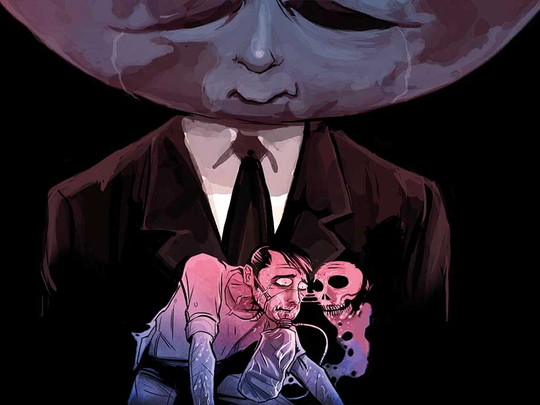
Conscience has become the mayfly of our era: here today, gone tomorrow. For the moment, the world is transfixed by the horrific images from Douma, near the Syrian capital, Damascus. Dozens have died, and hundreds lie injured after what was quite clearly a chemical weapon attack.
Dead children, their mouths flecked with foam, chide us through our screens. Condemnation, calls for action, a global spasm of what Martin Amis calls “species shame”: the pattern of response to the long Syrian catastrophe has become almost ritualised.
It was no different after the Al Assad regime’s chemical attack in Ghouta in August 2013; or when the image of Alan Kurdi, the drowned three-year-old refugee, became a symbol of shame in 2015; or the following year, as a similar status was accorded to the picture of Omran Daqneesh, a young boy pulled from the rubble of Aleppo, covered in blood and dust; or last April, when President Trump, supposedly traumatised by footage of the horror wrought by the sarin attack on Khan Sheikhun, fired 59 Tomahawk cruise missiles at Al Shayrat airfield in western Syria.
At the time, Rex Tillerson declared US policy to be that “the reign of the Al Assad family is coming to an end”. If Bashar Al Assad’s patron, Vladimir Putin, didn’t like it, that was just too bad. Yet, as so often, the fire and fury was transient.
Of course, the hellish scenes in Douma have jammed the brakes on Trump’s eagerness to disengage from the Syrian conflict, at least for now. He has tweeted with his customary dignity: “President Putin, Russia and Iran are responsible for backing Animal Assad. Big price to pay ... Another humanitarian disaster for no reason whatsoever. SICK!”
But what kind of response will follow, and for how long? Like a flare, global revulsion will light up the geopolitical sky for a while and force heads of government around the world to chime in with their outrage. The matter will be discussed robustly at the United Nations. There may even be a security council resolution. With luck, donations to aid agencies will spike.
And then ... nothing much will happen. The images from Douma will soon be wrenched from the digital shop window, supplanted by a sporting scandal or the latest commercial venture by the Kardashian clan. The statements of firm intent made by international organisations will melt into bureaucratic inertia. And the cycle will begin again.
Shameful procrastination
It need not have been so. There was a moment, after the Ghouta massacre, when Al Assad could have been forced to the table by a sustained and coordinated military and diplomatic campaign. A lengthy ceasefire would have stabilised the region, contained its warring factions and offered at least a glimmer of hope that a sustained peace might be brokered, probably involving a complex cantonisation of Baath-controlled Syria.
Many thousands of UN-authorised peacekeepers would have been required, as well as a daunting commitment to the reconstruction of the shattered nation’s infrastructure. The task would have been formidable, lengthy, expensive: all the things that 21st-century foreign policy is meant to avoid. But it was, at least, conceivable.
Why have we let this happen? First, the West has conspicuously failed to recover from the trauma of Iraq. To this day, the very word remains a shorthand for national shame, infecting the argument for military action of any kind. It has become a veto deployed gratuitously by those who oppose the Atlantic alliance, domestic security measures against Islamist extremism, or just about anything else. Too often the consequence of Iraq has been not sensible caution but sanctimonious procrastination.
Second, we do not have a viable Russia doctrine. We were caught napping by Putin’s cult of national destiny, authoritarianism and aggressive foreign policy. In the information war, he has made fools of the hemisphere that launched the digital revolution, by grasping so quickly how to weaponise its shiny toys.
I am, unfashionably, a liberal interventionist, a believer in the “ responsibility to protect “ doctrine in international law, codified by the UN world summit in 2005, which mandates the “collective use of force” in order to stop genocide and the massacre of civilians. I strongly support generous international development spending and believe passionately in the duty of wealthy nations to accept refugees.
But the world is turning away from such notions, isn’t it? The nations of the West are building walls, seceding from the EU, diluting democracy, embracing the isolationist populism of the right. I hope this is not a long-lasting settlement, but it is certainly in the ascendant.
So do not expect the horror triggered by Douma to be matched by the will to do anything too significant about it. Conscience will have its moment, as it always does. And then, tragically, normal service will be resumed.
— Guardian News & Media Ltd
Matthew d’Ancona is a noted columnist and writer.











